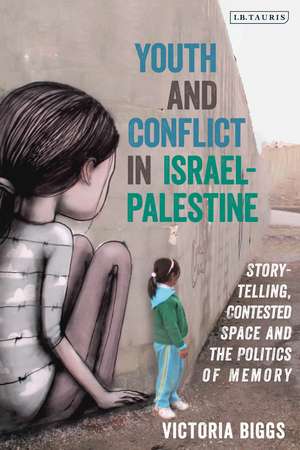Youth and Conflict in Israel-Palestine: Storytelling, Contested Space and the Politics of Memory
Autor Victoria Biggsen Limba Engleză Paperback – 29 iun 2022
| Toate formatele și edițiile | Preț | Express |
|---|---|---|
| Paperback (1) | 196.89 lei 6-8 săpt. | |
| Bloomsbury Publishing – 29 iun 2022 | 196.89 lei 6-8 săpt. | |
| Hardback (1) | 471.14 lei 3-5 săpt. | +25.75 lei 6-10 zile |
| Bloomsbury Publishing – 23 dec 2020 | 471.14 lei 3-5 săpt. | +25.75 lei 6-10 zile |
Preț: 196.89 lei
Preț vechi: 257.40 lei
-24% Nou
Puncte Express: 295
Preț estimativ în valută:
37.68€ • 40.91$ • 31.65£
37.68€ • 40.91$ • 31.65£
Carte tipărită la comandă
Livrare economică 23 aprilie-07 mai
Preluare comenzi: 021 569.72.76
Specificații
ISBN-13: 9780755636600
ISBN-10: 0755636600
Pagini: 208
Dimensiuni: 156 x 234 mm
Greutate: 0.3 kg
Editura: Bloomsbury Publishing
Colecția I.B.Tauris
Locul publicării:London, United Kingdom
ISBN-10: 0755636600
Pagini: 208
Dimensiuni: 156 x 234 mm
Greutate: 0.3 kg
Editura: Bloomsbury Publishing
Colecția I.B.Tauris
Locul publicării:London, United Kingdom
Caracteristici
Unique in juxtaposing the experiences of young people from both Palestinian refugee camps and right-wing settlement homes
Notă biografică
Victoria Biggs is a researcher at Durham University, UK. Previously she held the Max Batley Postdoctoral Fellowship in Peace Studies at the University of Sheffield, UK. She is also a special school teacher and storyteller working extensively with young people who have experienced violence. Her fieldwork in the Middle East was supported by the Council for British Research in the Levant.
Cuprins
Acknowledgements Once Upon an Intifada At the Edge of Known Stories Field Sites and Fault Lines Story against Narrative Young People as Storytellers Language and the Hidden Landscape Fairy Tale as an Idiom of Terror A Lexicon of Symbols Mother Tongues and Other Tongues Violence in the Narration of Self and Other Face to Face: the Fundamental Violence of Storytelling Storytelling as Self-Expression and Suppression Purity in Narrative? Storytelling as Transgression "What Do They Tell About Us?" Forbidden Histories in Contested Spaces Narrative Drifts into Forbidden Terrain Topographies of Forbidden History in Israel/Palestine "Until the Seventh Wave": The Liquid Borders of Memory Happily Ever After? Telling Endings Unfinished Houses The Sense of an Ending: Making Meaning through Narrative Structure "To Make the Dream Come True": Ending Political Violence Ending the Research: Central Themes and Patterns BibliographyIndex
Recenzii
[I]n addition to the book's empirical contributions, it makes methodological and theoretical contributions by adding to the corpus of knowledge on storytelling, narration, and contested histories ... Further, Biggs raises ethical questions regarding carrying out research in overstudied areas and explains how she adjusted her own approach to better listen to and empower the youth with whom she worked; thus, this book is of relevance to students of fieldwork methods more broadly, not only to those working in Israel/Palestine.
Victoria Biggs writes a compelling book that brings young people's stories into the foreground, troubling familiar narratives with a dynamic, rich and highly readable account of lives lived amidst violence, oppression and long-standing conflict. She argues that 'telling a story is an act of trust' and 'listening is an expression of responsibility'. I would urge all interested in the politics and narratives of Israel-Palestine to read this book and take that responsibility.
This book focuses on young people as storytellers in the violent and politicized Israeli-Palestinian context and gives us new insights into the worries, dreams and reasoning of Palestinian and Israeli youth. By giving voice to children and youth in Palestinian cities and refugee camps, in Israeli settlements as well as in bilingual educational settings, the author manage to transmit the complexities of identity formation, place-making, political stances and processes of othering.
Victoria Biggs writes a compelling book that brings young people's stories into the foreground, troubling familiar narratives with a dynamic, rich and highly readable account of lives lived amidst violence, oppression and long-standing conflict. She argues that 'telling a story is an act of trust' and 'listening is an expression of responsibility'. I would urge all interested in the politics and narratives of Israel-Palestine to read this book and take that responsibility.
This book focuses on young people as storytellers in the violent and politicized Israeli-Palestinian context and gives us new insights into the worries, dreams and reasoning of Palestinian and Israeli youth. By giving voice to children and youth in Palestinian cities and refugee camps, in Israeli settlements as well as in bilingual educational settings, the author manage to transmit the complexities of identity formation, place-making, political stances and processes of othering.
